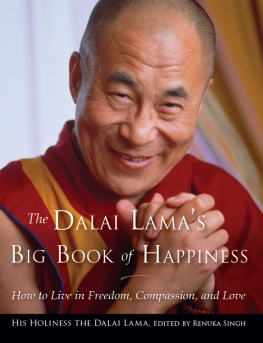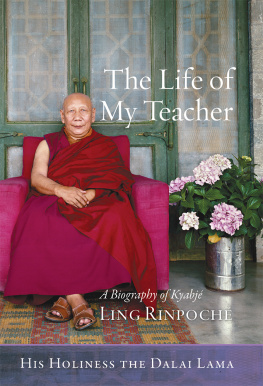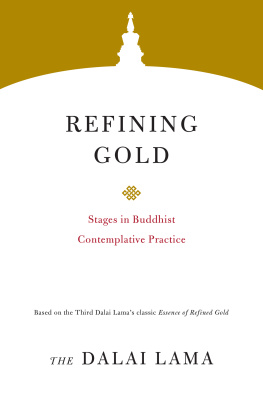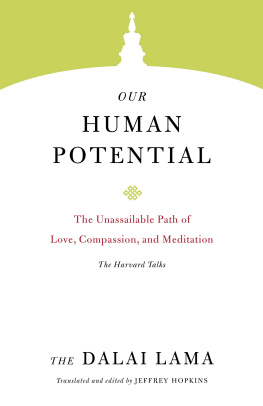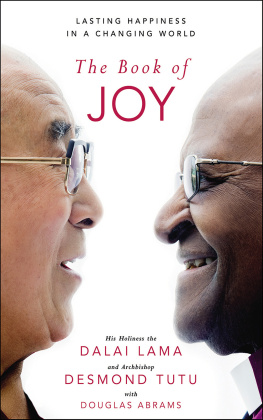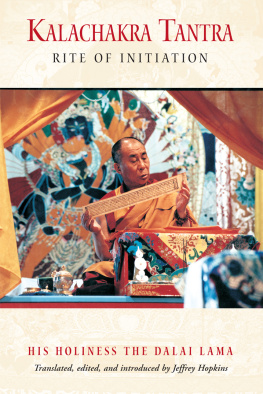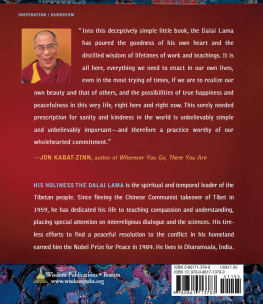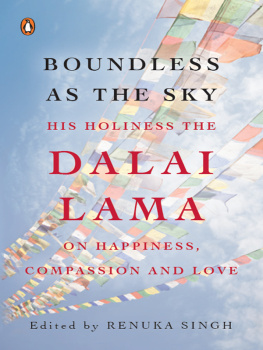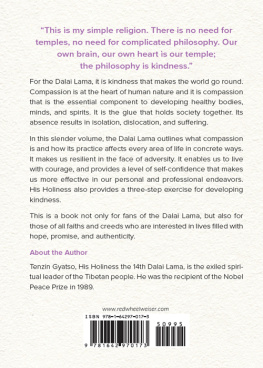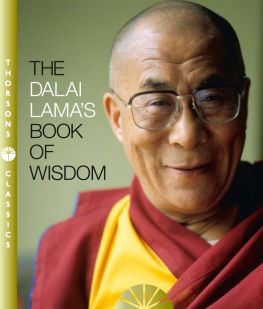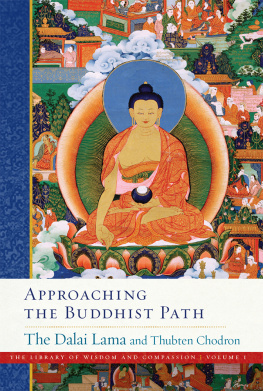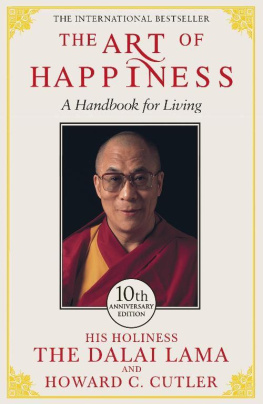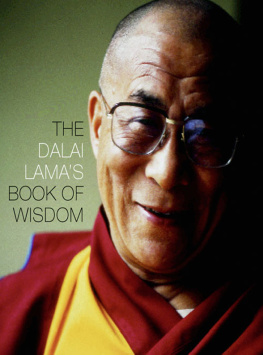
Copyright 2016 by His Holiness the Dalai Lama
Foreword copyright 2016 by Renuka Singh
All rights reserved. No part of this publication may be reproduced or transmitted in any form or by any means, electronic or mechanical, including photocopying, recording, or by any information storage and retrieval system, without permission in writing from Hampton Roads Publishing, Inc. Reviewers may quote brief passages. Previously published in 2013 by Penguin Books India, Penguin Ananda, India, as Boundless as the Sky, ISBN: 9780143421160.
Cover design by Jim Warner
Cover art by Eddie Adams / Corbis
Interior designed by Kathryn Sky-Peck
Hampton Roads Publishing Company, Inc.
Charlottesville, VA 22906
Distributed by Red Wheel/Weiser, LLC
www.redwheelweiser.com
Sign up for our newsletter and special offers by going to www.redwheelweiser.com/newsletter/.
ISBN: 978-1-57174-739-6
Library of Congress Cataloging-in-Publication Data available upon request
Printed in Canada
FR
10 9 8 7 6 5 4 3 2 1
www.redwheelweiser.com
www.redwheelweiser.com/newsletter
Editor's Dedication
To
The Long Life of His Holiness
The Dalai Lama till Samsara Ends

CONTENTS
PART ONE
THE SECRET OF HAPPINESS
PART TWO
FORGIVENESS AND COMPASSION
PART THREE
REALITY AND WISDOM
PART FOUR
INNER AND OUTER PEACE
PART FIVE
NON-VIOLENCE AND SECULAR ETHICS
FOREWORD
BUDDHISM HAS DIRECTED THE path of His Holiness the Dalai Lama's developmentboth inner and outerand remains a guide for humanity's course of becoming. The lectures compiled in this collection do not deal directly with the goal of enlightenment or Buddhahood. Rather, they highlight universal themes of compassion; non-violence and peace; secular ethics; a healthy body, mind, individual, and society; and the human potential for happiness through one's inner realizations. People the world over appear ready to receive the wisdom emanating from and about Buddhism that directly protects us from our sufferings.
As mentioned in the lectures, we all have the capacity to get rid of intellectual conceptions and negative emotions in order to avoid experiencing worldly turbulence and suffering in our lives. However, this does not imply that we cannot or should not try to reach full Enlightenment, self-liberation from samsaric sufferings or, at least, to achieve a peaceful state of mind.
These lectures also symbolize the spiritual deprivation of people from all parts of the world, as is evident in the scope of invitations His Holiness receives from various countries, universities, and organizations. Moreover, His Holiness often reiterates that human beings, irrespective of whether they are atheists or believers, remain at the core of human deliverance with their unique historical potential.
At any given moment, human beings can either elevate themselves to the state of liberation or descend into the quagmire of demoniac existence. The responsibility to transform body, speech, and mind in various cultural settings ultimately lies with individuals. In other words, thoughts and actions acquire a kind of non-contradictoriness and transport one to become truly humane.
The lectures herein reveal not only how human beings act but how, through their daily effort and perseverance, they can claim their uniqueness to conduct themselves in a wholesome manner, befitting their inherent nature, and become the awakened one, to preserve humanity. It is high time that humanity expels utopian designs and learns to face facts by strengthening individual integrity. One is obliged, therefore, to live humanely, which will, perhaps, become the root of equality. Also, if we do not cultivate compassion and inner peace, even world peace won't bring us our inner equilibrium.
Let us conclude with the example of Richard More from Ireland who works very closely with His Holiness in improving the lives of others. More's work with children in crossfire or conflict situations and his remarkable life story is indeed inspirational. He lost his eyesight in 1972 after being shot by a rubber bullet. Richard had the magnanimity to invite and extend a warm welcome to the soldier who blinded him to His Holiness's talk at the University of Limerick in 2011. His Holiness's message of compassion and forgiveness resonated very deeply in Richard's act of not harboring any anger or bitterness toward Charles, the soldier responsible for his condition. Incidentally, both Richard and Charles have built up deep friendships with His Holiness now.
Similarly, through these lectures, followed by questions and answers, many people will be able to relate to His Holiness and his insightful wisdom with greater ease.
Renuka Singh
2013
ACKNOWLEDGMENTS
MY DEEPEST GRATITUDE TO His Holiness the Dalai Lama, my root guru, for permitting me to work on his speeches given on various occasions at different places in the world. His Holiness's magnanimity of spirit is awe-inspiring. Thanks are also due to the Office of His Holiness, his secretaries, Chime Rigzin and Tenzin Taklha, for all their help in procuring the lectures for this book.
Special thanks are due to Ven. Ailsa Cameron, Kamalini Mukherjee, and Geshe Dorji Damdul for all their invaluable help in the preparation of this manuscript.
Chiki Sarkar, Shahnaz Siganporia, Chinmayee Manjunath, Niyati Dhuldhoya, and Monidipa Mondal at Penguin helped in facilitating the production of this book. Thanks. We have tried our very best to edit His Holiness's speeches minimally, so that the original flavor of his expression can be retained.
Finally, I wish to express my appreciation to my familythe Pauls in the United Statesfor supporting all my endeavors, spiritual and worldly. I hope my two grand-nephews, Sam and Harry, will one day go through this collection.
EDITOR'S NOTE
I ALWAYS SPEAK IN an informal way as it complements my broken English, says His Holiness in one of the speeches in this volume. To keep alive his voice and its particular flavor, we have left the speeches largely unchanged.
Renuka Singh
2013
Part One
THE SECRET OF HAPPINESS

1
THE ART OF HAPPINESS
New Delhi, 2011

G etting older, sometimes my eyes give me some problems, so very strong light is not good. And usually I give my talks without notes, so light is not necessary. So dear brothers and sisters, indeed I am very happy having this opportunity to talk, or rather lecture, for Penguin. You organized this opportunity; thank you very much. When I give a talk to people, I always have the feeling we are the same human beingmentally, emotionally, physically. And more importantly, everyone wants a happy life. I think nobody, early in the morning, as soon as they wake up, wishes for more trouble in the day. Nobody wants trouble. However, many troubles are essentially our own creation. Why? Here is the big contradiction.
I think because of two thingsthe first is a lack of knowing the reality, which also is due to the lack of a holistic view. That's one thing. The other thing is too much self-centered attitude. These two thingsthe lack of knowledge about the reality and a self-centered attitudeare, I think, what creates unnecessary problems. We can't say this problem happened because of this or because of that. We have to realize that the ultimate factor of these problems is within ourselves.
Next page
